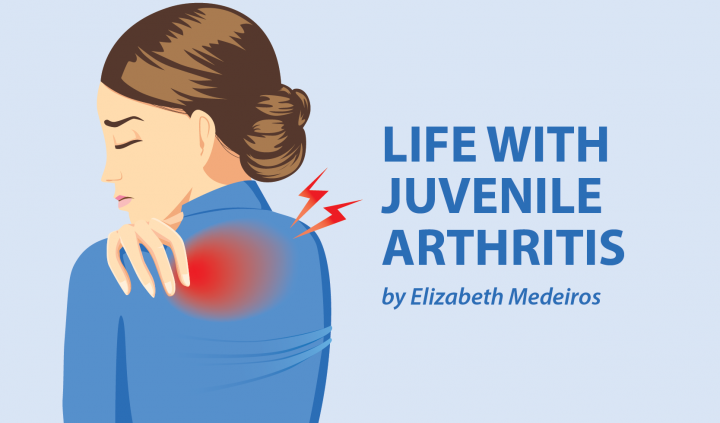As the warm weather approaches, I’ve been pulling out my favorite spring dresses. I slipped one on to visit family on Easter Sunday and smiled. I felt good. But then I took a look at my knees and wanted to crawl back into my jeans. After a long winter, I had forgotten how puffy and crooked they were. Even after a lifetime of dealing with juvenile arthritis, I still feel insecure about my body image sometimes.
Juvenile arthritis (JA) is considered an invisible illness because the pain isn’t obvious. However, the condition can have a significant impact on your appearance, beyond the swelling, redness, and deformity usually associated with arthritis. For example, JA treatments can cause dramatic weight gain or loss, acne, facial water retention, or even surgical scars. It’s no surprise that some kids feel extremely anxious about being judged or have been bullied about their appearance.
Judgment
Often, low self-esteem comes from unkind remarks. Kids can be cruel, making jokes at the expense of others. To this day, I’m still too embarrassed to dance in public because of the teasing I received at a school dance for being too stiff. But adults also make comments, often from a place of ignorance. For example, swim teachers used to say that I shouldn’t be swimming with “nail fungus,” even though what I had was nail psoriasis. Their comments made me feel embarrassed and self-conscious.
Judgment often comes from within. We’re our own worst enemies. We compare ourselves to others, especially over social media. We get hung up on the “me before I got sick.” It’s not easy to watch your body change; I had days when I was uncomfortable in my skin.
Support
Kids of every age need support when JA changes their appearance. As a parent, it’s hard to watch. While you may be tempted to pretend not to notice, it’s OK to acknowledge it, especially if your child seems to want to talk about it. Discussing changes in age-appropriate ways can help your child.
In some cases, young people may suffer from anxiety or depression because of poor body image. It’s essential to be vigilant and watch for signs of eating disorders or self-harm. Get your child professional help if they need it. Therapy and support groups can do wonders for kids and teens with negative body image. Knowing others going through similar situations and emotions is comforting.
Feeling comfortable
One of the best ways to help your child is to let them wear clothes that are comfortable and make them feel good, even if their outfits are unfashionable. Encourage them to engage in activities they enjoy and of which they can feel proud. Let them mourn or rant sometimes. It may not sound like much, but a little reassurance makes a world of difference.
I still wore the dress to Easter brunch, even after realizing it showed my knees to the world. It was my most comfortable dress, and the colors were perfect for spring. I received many compliments about it! And while I did feel a little insecure, for the most part, I felt comfortable and supported.
***
Note: Juvenile Arthritis News is strictly a news and information website about the disease. It does not provide medical advice, diagnosis, or treatment. This content is not intended to be a substitute for professional medical advice, diagnosis, or treatment. Always seek the advice of your physician or other qualified health provider with any questions you may have regarding a medical condition. Never disregard professional medical advice or delay in seeking it because of something you have read on this website. The opinions expressed in this column are not those of Juvenile Arthritis News, or its parent company, BioNews Services, and are intended to spark discussion about issues pertaining to juvenile arthritis.

